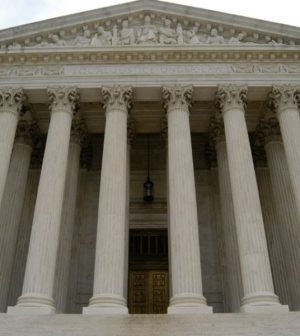- Could Your Grocery Store Meat Be Causing Recurring UTIs?
- Are You Making This Expensive Thermostat Error This Winter?
- Recognizing the Signs of Hypothyroidism
- 10 Strategies to Overcome Insomnia
- Could Artificial Sweeteners Be Aging the Brain Faster?
- Techniques for Soothing Your Nervous System
- Does the Water in Your House Smell Funny? Here’s Why
- Can a Daily Dose of Apple Cider Vinegar Actually Aid Weight Loss?
- 6 Health Beverages That Can Actually Spike Your Blood Sugar
- Treatment Options for Social Anxiety Disorder
SCOTUS Appears Skeptical of Arguments to Curb Abortion Pill Access

Following oral arguments presented on Tuesday, the U.S. Supreme Court looked poised to rebuff a legal challenge to women’s access to the abortion pill.
Mifepristone is part of a two-drug regimen now used for the majority of abortions nationwide.
In the case now before the Supreme Court, the plaintiffs claim the U.S. Food and Drug Administration did not follow proper procedures when it loosened regulations and allowed the medication to be available via telehealth or by mail.
However, there was little discussion during the hearing of whether the FDA’s decisions to ease restrictions on getting the drug were unlawful, NBC News reported.
Instead, the justices honed in on whether the group who brought the lawsuit even had legal standing to do so, NBC News reported. The plaintiffs, represented by the conservative Christian legal group Alliance Defending Freedom, claim the drug’s safety risks were not fully assessed by the FDA.
But justices on both sides of the political spectrum asked whether the doctors could show that they were directly injured merely because they object to abortion and might be required to give emergency room treatment to a woman suffering from serious side effects.
“Under federal law, no doctors can be forced against their consciences to perform or assist in an abortion, correct?” conservative Justice Brett Kavanaugh asked at one point, NBC News reported.
Conservative Justice Amy Coney Barrett asked similar questions.
Meanwhile, conservative Justice Neil Gorsuch said the case was a “prime example of turning what could be a small lawsuit into a nationwide legislative assembly on an FDA rule.”
The only justices who seemed willing to weigh the merits of the plaintiff’s central claim were conservatives Clarence Thomas and Samuel Alito, NBC News reported.
Alito wondered whether the FDA considered itself “infallible.”
In this case, the FDA has the backing of the pharmaceutical industry, which has warned that any second-guessing of the country’s drug approval process could cause chaos.
Liberal Justice Ketanji Brown Jackson seized on that issue in her questioning.
“Do you think that courts have specialized scientific knowledge with respect to pharmaceuticals … or do you have concerns about judges parsing medical and scientific studies?” she asked.
Yesterday’s hearing comes nearly a year after Texas-based U.S. District Judge Matthew Kacsmaryk issued a sweeping ruling that invalidated the FDA’s approval of the pill. Last April, the Supreme Court put that ruling on hold.
In August, the 5th U.S. Circuit Court of Appeals narrowed Kacsmaryk’s decision on appeal but left in place his finding that the FDA’s move to lift restrictions starting in 2016 was unlawful.
Both sides then appealed to the Supreme Court. In December, the court decided against hearing the challenge to the original approval of mifepristone in 2000. Instead, the court focused on the later FDA action, including the 2021 decision that made mifepristone available by mail.
The case’s outcome could have sweeping effects if access to the drug is restricted, with many states trying to limit abortion access in the wake of the Supreme Court’s decision to overturn Roe v. Wade in June 2022.
More information
Yale Medicine has more on medication abortion.
SOURCE: NBC News
Source: HealthDay
Copyright © 2026 HealthDay. All rights reserved.










